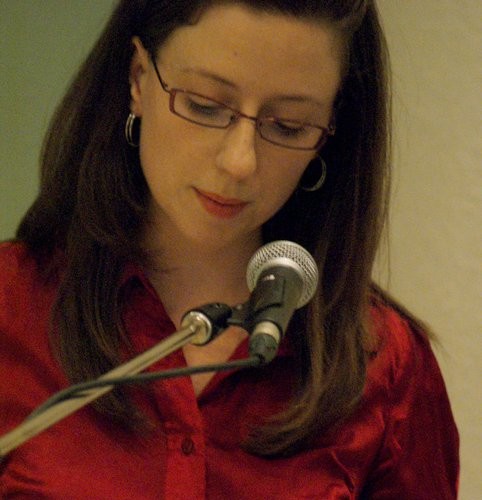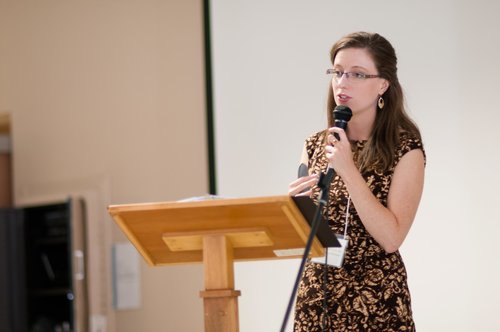‘We Are Ambassadors to the Pro-Life Cause’
Stephanie Gray gives advice for sharing the pro-life message.

Editor's Note: The introduction to this story was updated on Aug. 17.
Stephanie Gray is a pro-life presenter and author who, in addition to speaking on pro-life issues in Canada and internationally, trains college students and others to share and defend the pro-life message.
I often find that my friends don’t want to talk about pro-life issues, and so I’m afraid to bring up the topic. Isn’t it enough to pray?
Our prayer should lead us to action because we are called to be salt and light. We are commanded to make disciples of all nations and teach people all that God has commanded, the Scriptures tell us that. Therefore, there’s a need to bring this message of light and of life to the culture when people are in darkness; and that means that we have to directly talk to them and engage them. Even Pope Francis speaks about a culture of engagement, how we have to meet people in the culture and speak to them about these issues. And when we experience fear, that’s a normal experience when we’re communicating a message that may not be entirely received by people. But our responsibility is to have courage, which, as I once heard it defined, is not an absence of fear, but a will to do what’s right in spite of our fears. What we ultimately have to ask is what is right; and if we’re afraid, it’s almost irrelevant. The question is: What is the right thing to do?
Why doesn’t the pro-life message seem to resonate with a lot of people? What can we do as a movement and on a personal level to reach more people?
I think it’s important that we look at the power of language and use language to open people’s minds about the facts about abortion. Too often, the abortion-rights movement has used language to their advantage. They will describe abortion as “choice,” as “reproductive justice,” as a “woman’s right.” What we need to do is define abortion as the injustice it is — talk about it as an action which dismembers and decapitates and disembowels the body of a baby [as has been exposed in the undercover videos about Planned Parenthood]. We need to also use language that humanizes the unborn child; to talk about the unborn as the youngest of our kind. And then, as a result of this language, which very much defines the child as human and defines abortion as inhumane, we need to then bring this message directly to the public square.

How should we approach people to talk about pro-life issues?
There are all kinds of people that we will encounter. Some may simply be ignorant, in that they don’t know the facts of who the baby is or what abortion does to the baby. They have a few questions, such as: “What about rape?” And when we provide a logical, well-reasoned scientific and philosophical response, grounded in the language of human rights, it’s very easy to win such individuals over. But then there’s another category of people that you may encounter, where the issue isn’t so much that they don’t know, but that they don’t want to know. In their case, it’s not so much about ignorance as denial. Perhaps they themselves have a personal experience with abortion or one of their loved ones had a personal experience with abortion, and they may not receive logic so readily because of their emotional ties to the issue; and, therefore, we need a different line of questioning when dialoguing with such individuals: to ask them questions like, “Do you know anyone who has had an abortion? How are they doing?” To share stories of one’s friends who have had abortions and found healing in order to give a message of hope [is key].
What should our attitude be in these conversations?
In every encounter, I believe, we should all be remembering the prayer of St. Francis, which says in the midpoint of the prayer, “O Divine Master, grant that I may not so much seek to be understood as to understand.” I think that’s ultimately what should be driving us. How can I understand the unique individual before me? … Very much in that encounter of seeking to understand, remember that what’s really important is that we represent the pro-life cause well. In a sense, we are ambassadors to the pro-life cause — the way someone could be an ambassador to a country. An organization called Stand to Reason has identified what it calls three qualities of good ambassadors: knowledge, wisdom and character. It’s important as we interact with people to understand that we have knowledge, an accurately informed mind, and then that we have wisdom, which is an artful message. [Then we must consider] how to get what’s in our minds out of our mouths, so that it reaches the other person’s heart. And, finally, that we have character, which is an attractive manner.
What is a good way to start a conversation with someone who supports abortion?
To begin with, “What do you think about abortion?” is a great opener, because it allows the other person to share his or her views. It puts us in the position of listener as well as someone seeking to understand. From their response, then address whatever specifics they communicate. If they say they sometimes support abortion, then follow up that claim with a question. And if they say, “When a woman is poor,” respond with some common ground, acknowledging that to be pregnant and poor would be very difficult. Then ask the question, “If someone had a 5-year-old and suddenly became poor, would we ever permit the 5-year-old to be killed because of poverty?” If they say, “No,” then ask the question, “Why would we permit the unborn child to be killed for reasons of poverty?” If they say the analogy is flawed because a 5-year-old is a human but a unborn child is not a human, then that reaction shows what one really needs to do is to focus the conversation on the question of when life begins and whether the unborn child is a human or not. Then bring forward the evidence that, indeed, the child is a human beginning at fertilization.
What are some suggestions for following up after a conversation about pro-life issues?
Certainly, after talking with someone about abortion, it’s important to pray for that person and his or her receptivity to the pro-life message. As future opportunities arise, look for ways to ask if they have any further questions or if there are any resources they would be interested in you sharing with them. One thing I did with one supporter of abortion who I had debated with at length is I met him for coffee after our initial discussion and asked him if he could recommend one book for me to read, and I correspondingly recommended a book for him to read.
Susan Klemond writes from St. Paul, Minnesota.
- Keywords:
- abortion, life issues
- prolife
















